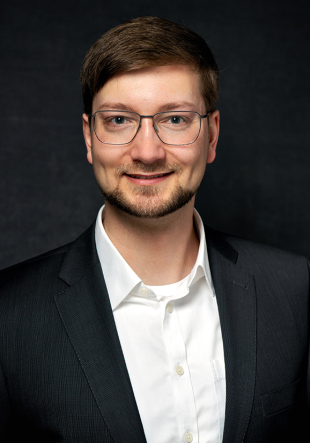Adaptive control of coupled rigid and flexible multibody systems with port-Hamiltonian structure
Duration: 2023 to 2026
Total funding volume: 832,488 euros
University funding volume: 252,168 euros
Sponsored by: German Research Foundation (DFG)
The aim of the project is to develop adaptive follow-up control methods for coupled multi-body systems with rigid and flexible elements. The rigid components are described by non-linear differential-algebraic equations. The flexible components are initially described by linear partial differential equations in one spatial dimension. In the course of the project, multi-dimensional flexible subsystems are also considered, which are discretised using suitable methods. Furthermore, the models each have a port-Hamiltonian structure, whereby the physical properties (in particular the energy balance) can be captured mathematically precisely. A special feature of port-Hamiltonian systems is that they have an intrinsically modular structure because any subsystems can be coupled via the respective ports. Despite these advantages, the port-Hamiltonian approach to modelling has so far hardly found its way into mechanics. Therefore, systematic methods for the sequential control of such coupled multi-body systems are lacking. In this project, a characterisation of important system-theoretical properties, such as input-output structures, possible dead times and the stability of the internal dynamics, will first be carried out on the basis of physical considerations by means of a structural analysis. Based on this, control methods are to be developed which guarantee that the follower error remains within a given field. For this purpose, methods of funnel control and inversion-based feedforward control are combined, which has already led to far-reaching results in the first project phase for the case of rigid multi-body systems in differential-algebraic form. In the second project phase, the feedforward control for an approximation of the flexible components via rough discretisations is now being designed and combined with a funnel controller for the exact model. The latter is intended to compensate for the approximation errors. By utilising the modular structure of port-Hamiltonian systems, the possibility of a recursive feedforward control design is also investigated. For the applicability of funnel control, approaches are considered that establish a functional relationship between the output and an alternative output co-located with the input. The performance and implementability of the developed methods will be continuously verified by selected experimental investigations. The experiments support the selection of technically suitable controller design parameters and thus lead to feedback between theory and practice.
Project partners: Prof. Dr. Timo Reis (Ilmenau University of Technology), Prof. Dr.-Ing Robert Seifried (Hamburg University of Technology)

